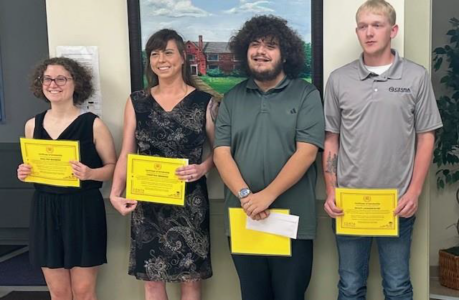‘Plunged into anguish’: Local paper tries to soothe public in wake of country’s second presidential assassination

Times Observer photo by Josh Cotton James Garfield’s home in Mentor, Oh. east of Cleveland. The home is now managed by the National Park Service and is open to the public.
- Times Observer photo by Josh Cotton James Garfield’s home in Mentor, Oh. east of Cleveland. The home is now managed by the National Park Service and is open to the public.
- Times Observer photo by Josh Cotton A screen for a fireplace inside the bedroom of James Garfield’s mother at his home in Mentor. In many ways, Garfield’s family turned the home into a memorial of the 20th president after he died in 1881.
- Photo from whitehouse.gov James A. Garfield, America’s 20th president.
No one ever talks about Garfield, Harrison, Arthur or Fillmore.
Now there are certainly reasons for that but in many ways I find the obscure presidents more interesting than the ones that always show up in a list of the nation’s best presidents.
There are so many life and leadership lessons to be gleaned from reading about how these men have handled their time in office.
Given that it’s a presidential year, I want to devote some of the summer to writing in this space about some of those obscure presidents and their elections.

Times Observer photo by Josh Cotton A screen for a fireplace inside the bedroom of James Garfield’s mother at his home in Mentor. In many ways, Garfield’s family turned the home into a memorial of the 20th president after he died in 1881.
Who did Warren County support? In the 19th century, how did competing Democratic and Republican papers cover elections? What did editors and local organizing committees have to say about Rutherford Hayes or Calvin Coolidge?
I want to start with an obscure president who served for just 200 days and, after Lincoln, is probably best known as America’s second assassinated president.
It might be unfair to start with his demise but we did just celebrate Independence Day.
He was shot at a train station in Washington on July 2, 1881, having just won election to the nation’s highest office the prior fall.
News of the shooting spread quickly across the country.

Photo from whitehouse.gov James A. Garfield, America’s 20th president.
And many Fourth of July celebrations were canceled as the nation entered some sort of state of mourning.
The Warren Mail was a weekly paper so it’s second edition after the news broke – July 12 – the editors wrote what is part editorial and part attempt to sooth readers.
“The people were stricken, overwhelmed and plunged in anguish,” the report said, emphasizing this sentence in italics.
“It was to them as a thunderbolt from a clear, noonday July sky, the first effects of which are indescribable. There was a complete suspension of business all over the country on Saturday afternoon. The reports of good and bad news kept the nation in a tumult of excitement, driving them from home to fear; exciting and depressing with shocking rapidity. Nor was this confined to the people of the United States. All of Sunday, throughout both continents, wherever the telegraph penetrated, there was excitement, inquiry, conjecture, hope and fear”
The preachers call us a wicked people. Perhaps we are,” the author wrote. “But no thought is more beautiful or sublime than the Nation’s faith and trust in God when the shocking news came that the President had been stricken down by the assassin’s hand.
“The Nation’s jubilee was at hand. But in many places the festivities of Independence Day were set aside for the meeting of humiliation and prayer for the president’s life. The President – our President irrespective of party or creed – was dying! He might be saved – there was one change. Human aid was hopeless.
And the Nation with wonderful unanimity bowed in humble faith and supplication to the great Giver of every blessing, asking that this one great, good life so important to every interest might be spared. Who shall say how far the agonizing prayers of that stricken noble wife and the numberless christian people and christian churches on that dark Sabbath day in our history, prevailed – in doing what was supposed to be impossible?
When Lincoln was shot we were schooled to deeds of blood and used to horrible tidings. Now peace and quiet reign. President Garfield, of all men, was disposed to allay political strife. Even his political opponents respected him as a man and trusted in his fairness and wisdom as a safe ruler. No man seemed less likely to provoke the hostility even of a madman and a fool.
The shock therefore was the more stunning and terrible. As a contemporary says, the startling news wrought the nation up to the highest pitch of excitement. No public calamity had ever produced a like effect on the public mind. It was not confined to section, State or city. The thrill of anguish, with the force of an electric shock, seemed to pierce every heart in the land.
It reached foreign lands and ruled everywhere hastened to inquire as to the causes of the foul deed, the character of the accessories of the assassin, and the ultimate effects it would have on the administration of the government and the course of the people.
This feeling did not cease to move the people everywhere. Men came together like brothers to weep over a mutual affliction. The injury to the President was every man’s sorrow. Every woman wept for it, and every child seemed hushed in silence by the gloom which lowered on the country and cast its shadows into the capitals of the nations of Europe.
Such was the sorrow of the American people – such their fears and hopes and such the sympathy of their world for them in their affliction. A ray of hope now beams upon the land, the light of which seems to be felt in all parts of the world.
The President lives, and there is reason to believe that he will survive the injuries he has received.
And this again elicits expressions of gratitude to God. Thus faith in God elevated the nation’s sorrow far above a common grief, and renders its rejoicing over the first assurance of recovery timeline.






